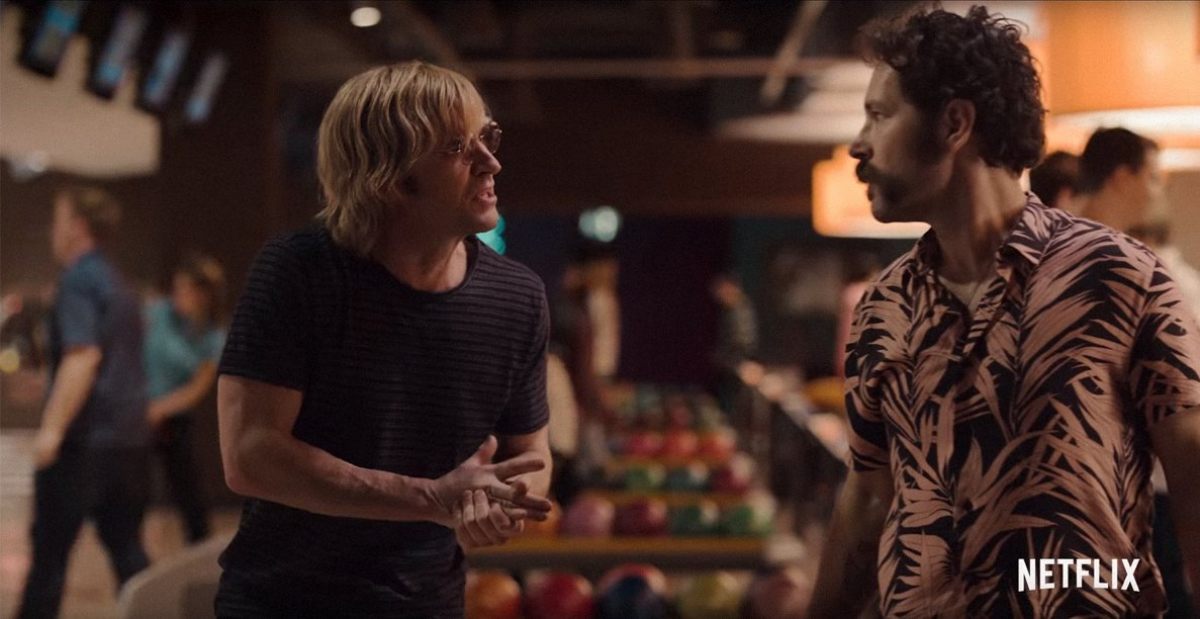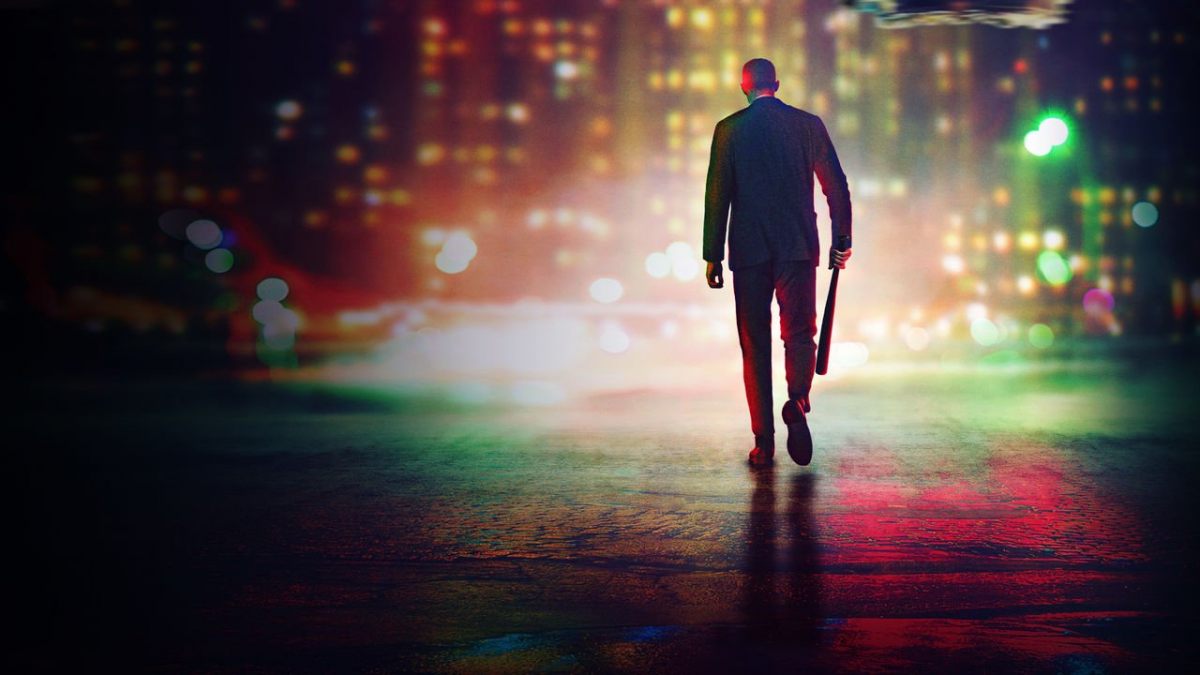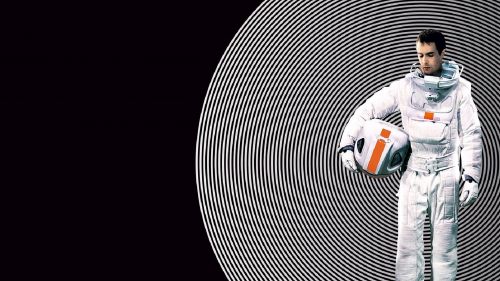MUTE: Welcome To Berlin 2052
Pick a day on either side of my arrival to the set of Netflix’s upcoming film Mute, and Berlin is a brisk, buzzing city in the throes of the holiday season, with Christmas markets sprouting up in various plazas, tourists exploring the landmarks, and smells of street foods both familiar and strange beckoning. But the Berlin of November 30th 2016 is a dreary, rainy, monochromatic tunnel, everything in my periphery defocused into a slate grey mush. That grey tunnel pulls me and a small handful of European journalists from the hotel lobby, into a van, down an endless stretch of anonymous highway, and into the collection of structures called Babelsberg Studios, where Duncan Jones and his crew are in the thick of filming.
As a first-time visitor to the city, I lamented my bad luck regarding the weather, but actor Justin Theroux soon informs me that the moody climate is partly why we’re here. “There is something...not post-apocalyptic, but something to the neverending dreariness of Berlin. It feels like there’s not a lot of light in the movie. Even in the soundstages, there’s always the shades pulled. Not a lot of vitamin D.”
Writer/director Jones (Moon, Source Code, Warcraft), who’s been trying to make this film for over a dozen years now, has even more reasons to film his thriller in Germany’s capital. “Mute has a feeling a bit like Casablanca, with these different immigrant communities that live in the city, coming and going all the time. And Berlin is this crashing point where east meets west, where Eastern Europe and Western Europe kind of blend; it makes it this very sort of active, busy, interesting city. Then you get the architectural side of the city, which obviously had a lot of rebuilding and many periods of history and we tried to bring as much of that into the film as we can. We shot in the interior and the exterior of the ICC building, and the inside - it looks like a Kubrick set. It’s the most amazing looking building.”
So Berlin it is, though on this particular day we are some 32 kilometers outside the center of the city, standing in the aforementioned Babelsberg Studios. Covered in that same grey meteorological wash, what we can see of the studio isn’t exactly Pinewood, but nor does one expect Germany to be ostentatious about the historic soundstages that have hosted film productions as varied as Metropolis, the Bourne sequels, and Captain America: Civil War.
Inside the massive soundstage, the quiet, calm crew of Mute is behind schedule. Seems filming ran late last night, so they started late today and now all energies are focused on getting a nightclub bathroom scuffle in the can. Leo Beiler (Alexander Skarsgård) is shoving two miscreants into the men’s room, fire in his eyes. We don’t know what these guys did, but Skarsgård’s face, all righteous fury, tells us they’ve got it coming. He’s calmed down and pulled away by his lady friend Naadirah (Seyneb Saleh), leaving the two goons licking their wounds in the gently futuristic washroom. (A bystander relieves himself at a urinal projecting an HD landscape of a tropical island.) Theroux emerges from a stall, barely recognizable in a blonde wig, tinted glasses and an extremely cozy-looking cardigan. He says something cryptic to the goons, flashes a grin and a peace sign, and leaves. Cut. The scene is repeated a handful of times, and the crew moves on to setting up Theroux’s closeup.
Theroux is playing Duck, one half of a pair of “underground surgeons” rounded out by “Cactus” Bill (Paul Rudd). Producer Stuart Fenegan mentions that the two characters are based on Hawkeye and Trapper John from Robert Altman’s M*A*S*H*; one look confirms that, well, of course they are. Rudd is rocking Elliot Gould’s formidable mustache from that film, and Theroux’s wig has caused observers with short memories to make Owen Wilson comparisons, but put them next to each other and the M*A*S*H* visual reference gels quite nicely.

But who the hell are they, really? When Naadirah goes missing, these two characters are...maybe guides, maybe obstacles? - in an underworld Leo must traverse to find her. Between takes, cast and crew remain cagey on specifics; Jones hesitates to call Cactus and Duck villains. “Paul and Justin are exactly who their characters are, but much nicer.” A brief chat with a warm and cordial Theroux confirms Jones’ “much nicer” assessment.
“(Paul and I) are kind of lighter characters, until…” He stops himself. “I don’t think we’re villains; I guess technically if you were breaking the cast apart we’re the villains. It’s more that there’s only one hero in the bunch and that’s (Leo) - and even he’s sort of a strange anti-hero. It’s sort of a collision of journeys - he’s having his journey and Paul and I are having our own.” Theroux seems to be dancing around certain details as he adds, “I wouldn’t call us the comic relief, necessarily - WE’RE having fun, which is not to say the audience is gonna be having fun with us.”
To hear Jones tell it, Cactus Bill and Duck were crafted from a need to resolve a particular narrative challenge he created for himself. “‘How can I make a film with a protagonist who doesn’t talk?’ That was the initial puzzle that I wanted to solve. And the way I decided to address it was rather than try to tell a whole story from that perspective, let’s spend half the film with that character and really keep that serious, emotional, sweet story, and on the other half let’s have two witty, loquacious, fast-talking American guys who can kind of balance out the tall, silent type on the other side. And I think it’s worked out really well.”
Theroux recognizes the tricky balance he and Rudd (who've appeared together in three other films, all David Wain and/or Michael Showalter comedies) are chasing. “Paul and I have talked extensively, and (as actors) this is a genre we know nothing about, as far as tone. Duncan told us ‘I want you guys to play light, fun, whatever,’ but we both realize we can’t have the same kind of fun we would have had in, say, another movie, because the characters are considerably darker. You can get away with more in a broad comedy because you just goof and have fun and improvise. This is a harder thing to improvise, because you constantly have to track where the characters are at and the actions they’re taking. They’re doing dark things, so you have to sort of respect the tone.”
That thought rings in my ears as Fenegan gives us a walking tour of the sets, including Cactus and Duck’s basement operating room. It’s thoroughly unpleasant looking, looks as though it should stink (it’s a set, so it doesn’t), and the juxtaposition of Rudd and Theroux’s affable vibe in this blood-stained industrial dungeon is a compelling thought indeed.

Across the way stands Leo’s apartment set, a spartan flat with piles of phone books, an absolute absence of modern tech (2016 or 2052), and a family photo in which, if you look closely, you’ll see Duncan Jones in full Amish patriarch drag. As Fenegan explains, Leo is a sort of lapsed Amish, eschewing technology in a world controlled by it. In searching for Naadirah, Leo - mute since a childhood accident - finds himself navigating a voice-commanded world that’s literally been designed to leave him behind.
That’s a curious wrinkle for a film that, according to Jones, began life as a grounded, gritty British noir. “When I first started working on Mute, I think it was before Gangster No. 1 and Sexy Beast and films like that had come out, so (the plan was) to do this little seedy gangster film. And then all these British films started doing that stuff and it felt a little bit pat. But over time you come up with new ideas and then we did Moon and there was a chance to create (with Mute) something more unique. There were different ideas that came into it that made it feel a bit more mature, allowing it to have its own voice, rather than just being an attempt at a noir thriller. I think it’s something pretty different now.”
Okay, but why set it in the future? “There’s some fairly unique opportunities as to how a thriller would work, and what (Leo) is up against, that would only work in a science fiction setting. The fact that he is a Luddite in a world that is full of technology that expects voice-activated everything, with antagonists who are incredibly comfortable with technology, it sets up a good conflict between him and what he’s up against. He’s got these principles that don’t really fit in with the world that he’s found himself in.”

The above is appropriately uttered inside the set for Foreign Dreams, the colorful nightclub in which Leo works as a barman. With its vibrant lightning, opulent decor, and seedy owner’s office overlooking the club from the second floor, Foreign Dreams looks like the business venture of a futuristic Carlito Brigante. We’re boxed out of the nightclub for most of this set visit, because the FX team is making a 3D scan of the space (so that they can eventually add CGI robot pole dancers, natch). In the owner’s office, stacks of deutschmarks bearing the faces of Angela Merkel, Karl Marx, Claudia Schiffer and David Hasselhoff are piled up on a desk - and under heavy guard from the prop department, who note with amusement that the background extras keep walking off with the “Hoffs.”

This attention to tactile detail sparks a poorly worded question about the appeal for Jones of going back to practical filmmaking after tackling the CGI world of Warcraft (turns out they built massive sets for the fantasy epic). The gaffe is graciously course-corrected by the director: “The feeling for us making this film is very much like it was back when we were doing Moon in that Stuart and I really have the freedom to just be creative and come up with things (on the day).” Jones is also using that freedom to capitalize on the talents of his cast. “Justin Theroux is a fantastic writer himself, and I’ll be working with him and riffing on ideas, and we can be very flexible and change things on the fly.” When asked if there’s any preciousness about improvising on a script he’s been nurturing for over a decade, Jones is quick to reply, “I’m always very happy to take credit for good ideas, no matter who came up with them!”
Jones recounts the oft-told story of having written Mute years ago as a planned first feature, and how Moon was a smaller, confined piece written almost in response to the then-impossible logistics of Mute. Then Source Code happened; Warcraft happened; life happened. But Mute never left him, nor did he leave Mute, both of them evolving and growing over the years and now, at last, finally meeting one another in Berlin. There’s the sense that the project’s fruition has unleashed a number of feelings in Jones, the bittersweet notion of finally getting here practically legible on his face. “It’s kind of exhausting, and very cathartic. You wait such a long time to do something like this and you maintain that enthusiasm (over the years) because you’ve had so much thought and imagination invested into it, and when you finally actually get to do it, there is kind of a weird ‘now that I’ve caught the unicorn, now what?’”
Acknowledging the previous reports that Mute is set in the same universe as his 2009 masterpiece Moon, Jones obliges our questions about the fate of that film’s Sam Bell(s) - which won’t be spoiled here - and is then whisked off to hash out tomorrow’s shooting schedule. As we leave, we see Jones at the head of a conference table, surrounded by crew, discussing what's next. They all seem a touch tired, maybe a bit solemn, but nonetheless united in their mission of figuring out just what to do with the unicorn they’ve caught.
Mute premieres on Netflix this Friday.

